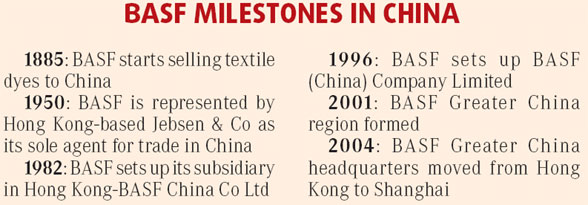
|
REGIONAL> Profiles
 |
|
Good chemistry - Johnny Kwan's "Honeybee"
By WAN ZHIHONG (China Daily)
Updated: 2008-05-26 11:50 Total investment in the project was $2.9 billion and BASF holds a 50 percent stake. It is the company's largest investment in China, as well as its largest single overseas investment in 140 years of history.
At the core of the integrated site is a steam cracker supplying nine world-scale downstream plants. The site can produce about 1.7 million tons of chemicals and polymers per year. All plants began commercial operations in mid 2005. Following its successful operation both Sinopec and BASF agreed to expand this joint project, with an additional investment of $900 million. New facilities will come on-stream starting in 2008. "The Nanjing integrated site has used BASF's most advanced technology. With production in the integrated site, we can save a lot of raw materials and energy, and also centralize our waste treatment and environmental protection," says Kwan. "Globally we have six such integrated sites. We can realize about 800 million euros of savings each year from these six sites." Apart from the Nanjing project BASF also expanded its production facilities in other regions in China. In mid 2006 the company's second biggest project in China, an integrated isocyanates complex started commercial production, with the total investment of $1 billion. In China, BASF is quickening its pace in research and development (R&D). It has set up a number of technical centers to improve the company's technology to better suit customers. These centers cover a lot of areas, ranging from automotive gear and footwear to lady's skin care. The company is also paying a lot of attention to basic research. Started in 1997, the BASF Sino-German R&D fund has supported collaborations with Chinese universities and relevant institutes through grants and scholarships. "Until now we have been running over 50 research projects under the fund, covering fields like macromolecule material science, organic compounds, industrial catalyst research, nanotechnology and biotechnology," says Kwan. Future development Looking into the future, Kwan says, "organic growth and mergers and acquisitions (M&A) are equally important to BASF in China". Besides a lot of investment in East China, the company is seriously considering making a major investment in the West in Chongqing, to produce MDI, an important chemical raw material. In some businesses, BASF is also looking for M&A opportunities. For instance, in 2006 the company acquired domestic concrete additives producer, Hi Con. China's construction chemicals industry is growing very fast. The company will take advantage of this to better develop the business, says Kwan. In the past few years, BASF acquired some companies globally. It bought Degussa's construction chemicals business, acquired Johnson Polymer, as well as the catalysts producer Engelhard. In China, any M&A deals must match the company's overall strategies, which is to better serve the customers and the environment, he says. With Chinese government putting more emphasis on the environment, the country's chemical industry will see healthier growth in the future, says Kwan. "In BASF, we are not only doing environmental protection by ourselves, we are also promoting it in cooperation with the Chinese government and the industry authorities," he says. 
|